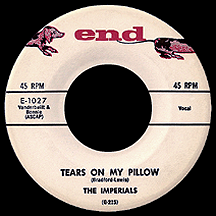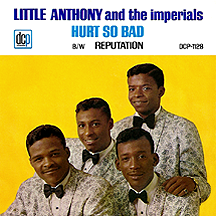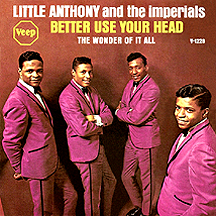LITTLE ANTHONY
AND THE IMPERIALS
Having a hit record is one thing. Getting that second hit, or third, can be more difficult. Anthony Gourdine knows this all too well. He was a member of three vocal groups and tried a solo career on his way to pop stardom, and though it took a few years, things worked out nicely for him. He started going down that winding road in 1955 while still in high school, singing with The Duponts in an area of Brooklyn where it was hard to find a street corner that hadn't been taken over by a doo wop group. Like the company that first made its mark manufacturing gunpowder more than 200 years ago, these Duponts made an explosive sound...in the neighborhood, at least. They were good enough to have three singles released between 1956 and 1958, each on a different record label: Winley, Royal Roost and Roulette. After the first two in '57, Anthony left to join The Chesters, a group his friend, baritone Clarence Collins, sang in with bass Nate Rogers and tenors Tracy Lord and Ernest Wright, Jr.
They had no trouble getting in the door at Bess Berman's Apollo Records and cut a single near the end of the year, "The Fires Burn No More," featuring Anthony's falsetto lead vocal. But Berman's company was in a state of disarray by 1958, so the group approached Richard Barrett of the Gone and End labels, hoping for a shot with the presumably more stable company. They told him they hadn't made any money off their record but owed Apollo 125 dollars for their stage outfits. Barrett gave them the money to pay off the debt, and even though he liked their sound, he wasn't interested in signing them since he already had a full plate with hitmakers The Dubs and The Chantels, in addition to an up-and-coming new group, The Miracles, whose lead singer, Smokey Robinson, had a vocal quality similar to Anthony's. But they persisted until he finally gave in and convinced label boss George Goldner to give them the go-ahead, changing their name in the process to something more regal and impressive: The Imperials.
"Two People in the World," written by Barrett and Wright, was recorded at the first session of the newly-christened quintet. With their sound so close to the Miracles, whose "Got a Job" had already been released, Barrett recorded each of the guys as lead singer in the hopes of coming up with something distinctively their own, yet Anthony's falsetto stood out above the others and his version became the final take. Next they did the Sylvester Bradford-Al Lewis song "Tears on My Pillow," and the first single release by The Imperials on the End label was ready with a ballad on each side, setting the tone for future releases. Alan Freed of New York's WINS, the most influential disc jockey in the city, loved the record and played both sides. Freed often singled out the lead singers on group records and began identifying the act as Little Anthony and the Imperials. At about the same time, a gospel group from Texas sent Goldner a telegram informing him they were the Imperials! Since Freed's sizeable listening audience knew them by the longer name, they made the adjustment, reflected on all successive pressings of the single. Anthony was now "little," like it or not. "Tears" hit the top ten in September 1958, and while "Two People" somehow missed the charts, it received airplay in many cities, and the record today is considered a classic two-sided hit.
Scoring a follow-up hit was more difficult. Neil Sedaka and Howard Greenfield were in the early stages of their own successful songwriting career with a pair of Connie Francis hits ("Stupid Cupid" and "Fallin'"). Sedaka approached the Imperials with a song the two had written, "The Diary," which Goldner was so impressed with that he told him it would be the group's second single. Barrett countered with a song of his own, "So Much," which was released and unpredictably made a poor showing. When Sedaka realized his song hadn't come out as promised, he released his own version, which went top 20 in February 1959, Neil's first of many hits as a singer and songwriter. Goldner quickly pressed up the group's recording as the next 45, but Sedaka had struck and the damage was done. Further Little Anthony and the Imperials singles hit the charts, just barely, including Bradford and Lewis's "Wishful Thinking" that spring and the Gary Shelton composition "A Prayer and a Jukebox" in the summer of '59, excellent efforts that are a pleasure to listen to now but were largely ignored when they first came out.
An attempt at an uptempo number failed altogether. Based on The Isley Brothers' breakthrough hit "Shout" in the fall of '59, "I'm Alright" had an identical arrangement and a repetition of lyrics that had worked for the Isleys, yet the Imperials record came off as a blatant imitation. The streak of nonhits was reaching a point of concern; despite the overall high quality of production and Gourdine's appealingly heartfelt vocals, nothing the group or label heads tried seemed to work. The next single, though, put them back in the top 40. A catchy little ditty by Bob Smith about a native boy and girl, "Shimmy, Shimmy, Ko-Ko Bop" took off at the beginning of the new decade and it looked like the guys would be multiple hitmakers after all. And so they would...just not right away.
Two of the best Little Anthony and the Imperials singles, "My Empty Room" and "I'm Taking a Vacation From Love" shared the same low-to-no-chart fate as the others between "Tears" and "Ko-Ko Bop." In 1961, feeling an amicable split might give each act a better shot at success, Anthony went solo while the Imperials took a separate path. Lord and Rogers left, Sammy Strain (formerly with The Chips) and George Kerr joined up, then Kerr was replaced soon after by Kenny Seymour. Over the next couple of years the two separate entities achieved far less than they had as one; no singles even managed to scrape the bottom end of the charts. Anthony returned in 1963 for another attempt at finding the magic formula. Few at the time could have foreseen the British Invasion of the near future that would so thoroughly roadblock many American artists, making it much harder for them to achieve airplay or sales for their music. For nearly all doo wop groups the heyday of the '50s and resurgence in popularity of the early '60s came to an end. Little Anthony and the Imperials were the rare exception; their greatest period of popularity was still to come.
Anthony had never liked being called a doo wop act, feeling the group needn't be boxed in by such a narrow classification. As a foursome now made up of Collins, Wright, Strain and Gourdine, they landed a contract with Don Costa's recently-formed DCP label. Teddy Randazzo (a popular artist himself with The Three Chuckles and solo hits including "The Way of a Clown") was writing, producing and working A&R for the label in 1964. He took the Imperials under his wing, helping to refashion their sound more in line with the soul trend of the mid-'60s. "I'm on the Outside (Looking In)" took full advantage of Anthony's knack for conveying sadness through song. Their very first release for DCP, it went top 20 in October 1964.
The next release returned them, after seven years, to the top ten: "Goin' Out of My Head" had all the elements of drama and heartbreak, Anthony's anguished voice ('...out of my head, day and night, night and day and night!') wrapped around Costa's string section and heart-tugging french horns. A smash hit at the end of the year, the Randazzo-Bobby Weinstein creation was one of the best songs of 1964, the Imperials' pinnacle, becoming a standard that has been remade by many top artists through the years. The next single, "Hurt So Bad," by the same writing and producing team, also hit the top ten and has become a lasting standard in its own right. The summer '65 hit "Take Me Back," a fourth consecutive ballad, hit the top 20 as well and "I Miss You So" went top 40 (with backing by the infamous 101 Strings, rarely credited on an actual hit single). 1965 turned out to be the group's most high-profile year. Anthony's finely-tuned, emotionally-charged singing connected with listeners in an intimate way quite unlike other artists at that time.
The group continued with a more moderate level of success through the remainder of the decade. Recording for the Veep and United Artists labels with Randazzo still producing and writing, they were Anthony and the Imperials for a year or so, but restored the "Little" to Anthony's name by 1969, where it remains today. Once again their records lived in the lower reaches of the charts, a familiar pattern from the early days, but the group's solid backlog of hits kept them in demand as a name act; they peformed in venues small and large, including an engagement at New York's Copacabana in 1969. Ernest Wright left in 1971 to sing backup for former Platters leader Tony Williams and Sammy Strain hooked up the following year with The O'Jays, just in time for that group's '70s hot streak. The remaining Imperials, Clarence Collins, Kenny Seymour, Harold Jenkins and Little Anthony were signed to the Avco label and had a couple of hits on the R&B charts. Anthony later made gospel recordings and the group reunites from time to time to perform together.
NOTABLE SINGLES:
- Must Be Falling in Love - 1956
as the Duponts - Prove it Tonight - 1957
as the Duponts - The Fires Burn No More - 1958
as the Chesters - Screamin' Ball (At Dracula Hall) - 1958
as the Duponts - Tears on My Pillow - 1958
as the Imperials /
Two People in the World - 1958
as the Imperials - So Much - 1958
- The Diary - 1959
- Wishful Thinking - 1959
- A Prayer and a Juke Box - 1959
- I'm Alright - 1959
- Shimmy, Shimmy, Ko-Ko Bop - 1960
- My Empty Room - 1960
- I'm Taking a Vacation From Love - 1960
- Please Say You Want Me - 1961
- That Lil' Ole Lovemaker Me - 1961
as Little Anthony - I'm on the Outside (Looking In) - 1964
- Goin' Out of My Head - 1964
- Hurt So Bad - 1965
- Take Me Back - 1965
- I Miss You So - 1965
- Hurt - 1966
- Better Use Your Head - 1966
- It's Not the Same - 1966
as Anthony and the Imperials - I'm Hypnotized - 1968
as Anthony and the Imperials - Out of Sight, Out of Mind - 1969
- The Ten Commandments of Love - 1969
- Help Me Find a Way (To Say I Love You) - 1970
- I'm Falling in Love With You - 1974




